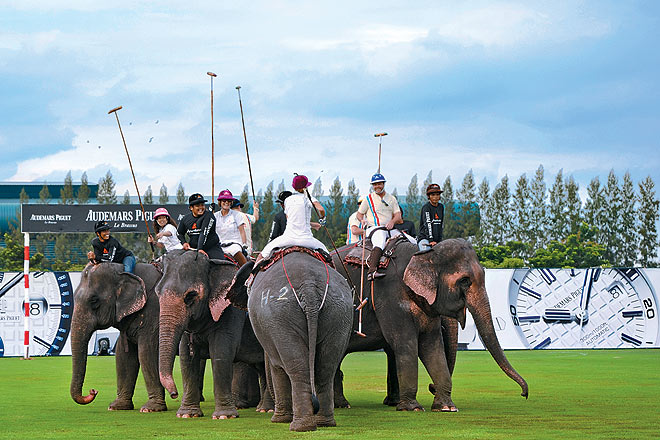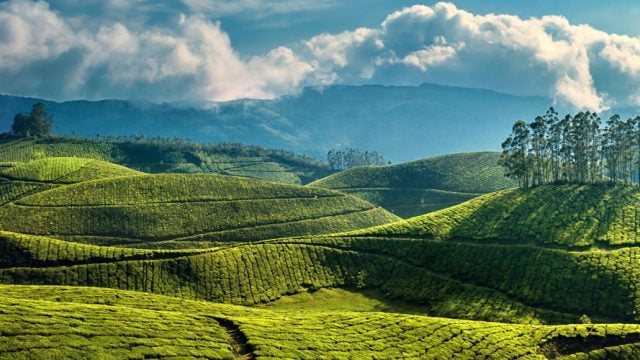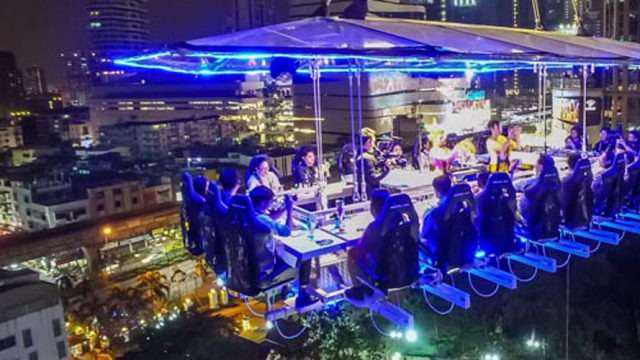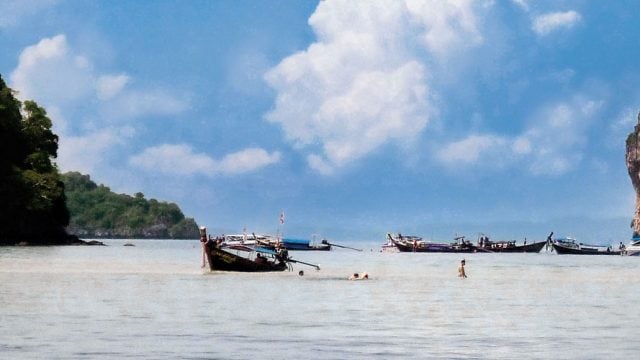“The elephant is considered auspicious in Thailand,” says my guide Tim as we pass a huge hoarding
Rhymes and a team of about 500 people have been working round the clock to ensure that this year’s King’s Cup Elephant Polo tournament goes smoothly. I am here to watch pachyderms play polo. This is a version of horse polo that swaps the horse for the kingdom’s national symbol—the elephant. The tournament, introduced to Thailand in 2001 by Anantara Hotels, Resorts & Spas, has grown to become one of the biggest charitable events in Thailand, raising funds for projects that better the lives of elephants.

Natasha asks me to pick out my complimentary polo jersey from the resort’s King’s Cup counter. Many teams are named after their corporate sponsors (like Citibank, Johnnie Walker and Mercedes-Benz). I mull over the grey-and-white Mercedes-Benz team jersey, but finally opt for the black one belonging to New Zealand’s national rugby union team nicknamed All Blacks. “You picked the most popular one,” says Natasha. “You’ll meet the players tomorrow. Some are from India.”
After a short nap, we are off for dinner on board a beautifully restored wooden rice barge. This is Anantara’s signature Manohra dinner cruise along the Chao Phraya River. The waves gently rock the barge as we sail through Bangkok, high-rises and hotels rise up on both sides, rubbing shoulders with spectacularly lit ancient temples and palaces. We pass the famous Wat Arun (Temple of Dawn), the magnificent Grand Palace, and the Royal Barge Boathouse. Dinner is Thai—lobster, chicken, asparagus and oyster mushrooms, and a deliciously fragrant Tom Yam Kung (tiger prawns served in a tender coconut shell).
Back in my room, a stuffed elephant in deep burgundy silk is perched on my bed—a gift from Anantara. Elephants playing polo—my mind can’t wrap itself around that idea yet. I tuck in early, with images of dainty elephants, ornamental china teacups, and polo sticks forming an ever-changing mosaic in my dreams.
The next day dawns with clouds, but with a sunny lining. I head for breakfast downstairs. Trader Vic’s is milling with people—players in their jerseys, organising teams, and some of my companions from the dinner cruise. The day promises to be a balmy one, so I decide to keep it light with some fruits and sushi with sides of pickled ginger, beetroot and wasabi.

Tim meets me in the lobby and we are off to VR Sports Club, east of Bangkok, where the tournament is being held. As we walk into the grounds, we can hear cheers from the crowd. The game has already begun. Elephants are playing polo—and I can tell you, huge beasts trundling around with pith-helmeted polo players on their backs is a surreal sight. The ground is a swirl of the grey, wrinkled beasts with their mahouts on top, shouting out instructions. Players are perched behind the mahouts. They wield seriously long sticks, swinging frantically, aiming for the ball. Some of the elephants try to beat the players and kick the ball before anyone else can get to it. Next to me, a pair of children jump up and down, yelling “Go elephant!” Accompanying them is their mother Katrin Martasek, dressed in a dusty rose mini lace dress with boots, a designer from Prague. “It’s a great day out for them.”
This year’s tournament has 50 elephants and 16 teams, including the rugby players of New Zealand’s All Blacks, international polo players, and performers from Thailand’s famous transgender cabaret, Miss Tiffany. The previous year’s tournament featured German royal Prince Carl-Eugen Oettingen-Wallerstein.
All the work associated with ensuring the elephants’ safety and the annual event is carried out by Anantara’s own elephant charity—the Golden Triangle Asian Elephant Foundation (GTAEF). The umpire for the tournament is John Roberts, Director of Conservation for the Anantara Group. Roberts has been involved in conservation programmes in the UK, Australia, Laos and the US, and watches each elephant closely to make sure everything is fine. Halfway through the play, Roberts directs the action to shift to a covered area as there are chances of the elephants slipping on the wet grass. The white polo ball is replaced by a larger red ball, which the elephants do not seem to like very much. So Roberts stops the play. “I could see they were confused—probably because they couldn’t pop the red ball. Most of them have been in entertainment shows in the past, so they are familiar with footballs, which they have to pop as part of the routine. Our indoor ball didn’t react the way they expected it to when they stood on it.” Roberts gave them some time to see if they would get used to it, but, “as they didn’t settle in I called the game off. If the elephants aren’t happy with something, we don’t continue.” Only domestically bred elephants are selected, says Roberts. Each elephant is only allowed 30 minutes of polo time per day. They get good food, vitamins and medical care during the tournament. And, at the end of the tournament, they help raise millions in donations for the care of Thailand’s elephants.
Colourful statues of hand-painted baby elephants break up the bright green expanse of the club grounds. These are part of Elephant Parade, a travelling art project that seeks to raise public awareness and support for Asian elephant conservation. Some of the statues have been hand-painted by well-known artists and designers, including Tommy Hilfiger and Matthew Williamson.
The men from New Zealand’s All Blacks are playing Miss Tiffany, announces the commentator. Last year, the All Blacks were almost beaten by the Thai Ladyboys team. The final score was 2-1, but the Auckland Herald headline the following day read: ‘All Black Greats nearly beaten by the Fairies of Siam’.
A live band with cello and violin players on a raised stage belts out classical numbers. A whole roasted pig graces the entry to the stall sponsored by Louis Roederer, a producer of champagne from Reims in France. A massage stall offers neck- and shoulder-massages in case watching polo has given anyone a crick. A smorgasbord of food and drinks is available inside the marquee area. In between watching the action, I graze on squares of spinach and cheese; cheese with cold cuts, apricots and walnuts; Wagyu beef burgers; mini bowls of Caesar salad; and wine. At the Hendrick’s Gin stall, I pick up a delicate golden cocktail served in a china cup and saucer (it’s a mix of their signature rose-flavoured gin and elderflower syrup). Local TV crews scout around for Thai celebrities and supermodels. They are mesmerised by a polo player in an advanced stage of undress. All he’s wearing is a hat, boots and black underwear with the legend ‘Rip and Curl’ strategically on his rear. The crews surround him as he gamely poses and answers questions.

By the Anantara food stall, a heavily made-up woman in a scarlet frou-frou dress with a jauntily-perched hat in white is attracting curious stares. “She is dressed like the Thai queen,” says someone. Fashion police are patrolling the area looking for winners for the best-dressed competition. A stall sells hand-woven hats of natural straw from Ecuador. Hats are the leitmotif here—striped black and white ones, wide-brimmed straws, hats shaped like giant flowers and fruits. Men are dressed in striped jackets and shirts in pastel colours. It’s like a day at Ascot, complete with the threat of rain. I come across a group of women from Dubai complaining about the damp soil ruining their shoes. Who wears stilettos to a polo ground, I wonder, looking around at the plethora of high heels that are sinking into the mud and straw.
Evening falls, and the stage is set for the grand finale of the day—the Miss Tiffany cabaret performed by Pattaya’s famous ‘ladyboys’. The dancers in brilliantly sequinned and feathered costumes perform one chartbuster after another. Some polo players get up on stage, and that’s the cue for others. Soon the stage is swamped with people dancing and taking selfies with Miss Tiffany members.
It’s the final day of the tournament, and I wake up to clouds and a headache, probably caused by all the wine. A breakfast comprising a comforting bowl of miso soup with toppings of tiny fried fish, seaweed and tofu clears the pain somewhat.
We arrive at the VR Sports Ground to find it has rained overnight and the ground is soggy and muddy. I sit down at a table that has a mix of media people from Singapore and Russia. There are 12 elephants on the field instead of the mandatory six, and the commentary is sounding garbled. I am informed that due to the threat of rain, it has been decided that two simultaneous matches will take place on far sides of the field in order to wrap up the tournament early. So there are two commentary feeds.

Several military-type gentlemen are standing around looking stern. Security has been beefed up as the prize today will be given away by the Thai king’s royal representative, Privy Councillor Rear Admiral Usni Pramoj.
On the field, an all-girls team from Mercedes-Benz (comprising Stine Heiselberg, Lucy Monro and Carolyn Syangbo of Tigresses Polo, elephant polo’s most successful ladies team ever) are playing men from The Peninsula. The girls lose by one lousy penalty shootout goal. The second match has the Louis Roederer (Hong Kong) team playing three-time winners Audemars Piguet. The AP team has Indian polo-playing brothers Uday and Angad Kalaan, and they trounce Louis Roederer without much trouble.
During the break, Anantara’s elephant man John Roberts comes up to say hello. I comment that he looks a bit tense. “I’ll be able to relax after this is over,” he says. “These are elephants, after all.” He insists that I have to meet Tony Nevin, the only wildlife osteopath in the world. Nevin is rushing to the airport and barely has time to talk. He was called in to work on the elephants at Anantara’s camp. Among the pachyderms he has treated is a bull elephant that was wounded in a fight and couldn’t bend its leg.
Back on the field, Audemars Piguet is beaten by King Power Duty-Free in the finals. The trophy is handed out. It is time for the elephants’ hard work to be rewarded. They get a fruit buffet, which of course is an all-you-can-eat.
The information
Pachyderm polo
Elephant polo is played in Nepal, Thailand, Sri Lanka and India. Teams consist of players from all over the world—Scotland, Thailand, Switzerland, India, Hong Kong, the US, Sri Lanka, Nepal, and even Iceland. The UK’s Pukka Chukkas team competes as a Commonwealth Team in the World Elephant Polo Championships.
The King’s Cup in Thailand is the biggest event of the game. The 2015 edition of the King’s Cup is likely to be held in the last week of August.
The game has a few bizarre rules. For instance, it is a penalty if an elephant lies down in front of the goal line.
The origin of the game is shrouded in mystery. The story goes that it was an inspired solution thought up to keep members of harems busy, that it was thought up by bored Raj officers. The WEPA (World Elephant Polo Association) website says the modern version was formulated in a bar in St Moritz by Scottish landowner James Manclark and former Olympic tobogganer Jim Edwards. Scots and elephants? It makes sense when you consider the tournament’s long-term sponsor was Chivas Regal, and one of its founders is Scottish.
The game has had its fair share of controversy. In 2006, animal rights activists in India asked for the cancellation of the Elephant Polo Cup in Jaipur. The event went ahead, and was supported by Swiss jeweller Cartier and the UK-based Elephant Family, a group dedicated to the welfare of Asian elephants. In 2011, the Cup was cancelled after a campaign by PETA (People for the Ethical Treatment of Animals) raised concerns about captive elephants being trained using spikes and pokers.
You can find more information on the game at the WEPA website: www.elephantpolo.com.
Where to stay
The Anantara Bangkok Riverside Resort & Spa (from Rs 8,000; +66-2476-0022, www.bangkok-riverside.anantara.com) is located on the west bank of the Chao PhrayaRiver and is roughly 45 minutes from Bangkok’sSuvarnabhumi International Airport.
Elephant polo
Kings Cup Elephant Polo tournament
Leave a Reply
You must be logged in to post a comment.





